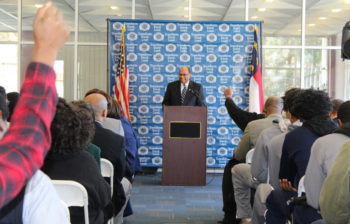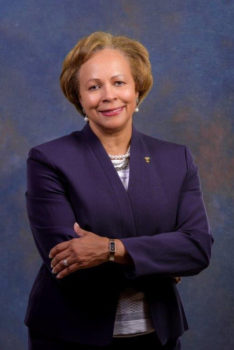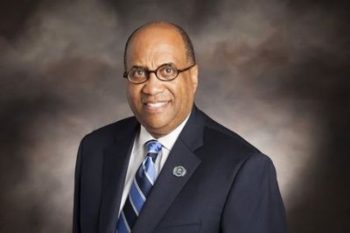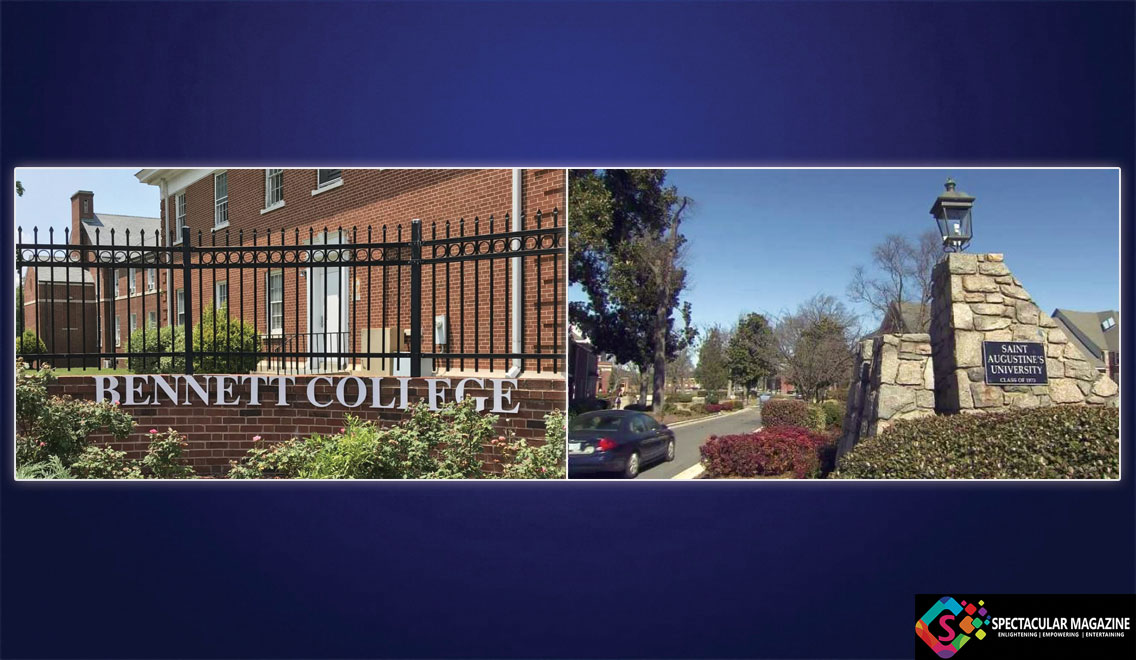Differing Fates For Two HBCUs In North Carolina
Two historically black institutions in North Carolina faced similar situations heading into this month’s Southern Association of Colleges and Schools Commission on Colleges annual meeting.
Saint Augustine’s University in Raleigh and Bennett College in Greensboro had both been on probation for two years because of concerns about their finances. SACS does not allow for a third year of probation, so each institution was facing one of two outcomes: have its probation lifted or lose its accreditation.
The first possible outcome would mean the college or university would have its accreditation extended; continuing its access to all-important federal student aid. The second would jeopardize almost any institution’s ability to keep its doors open, as loss of accreditation means loss of access to those federal funds, along with the revenue they provide and the vast majority of students who depend on federal financial aid to help them pay for college.

On Tuesday (Dec. 11), St. Augustine’s learned its probation was being lifted after it had assuaged the accreditor’s concerns. Bennett, on the other hand, was not able to satisfy SACS and is in line to have its accreditation revoked. Bennett’s president has pledged to appeal the decision at a February hearing, and the college is now widely soliciting donations to strengthen its standing. It will continue to be open and accredited during its appeal.
Even before the outcome of any appeal can be known, the cases of the two institutions demonstrate the long and difficult paths that struggling colleges and universities travel as they fight to shore up their finances — and the way those paths diverge during the complex and sometimes opaque crucible of the accreditation process.
The two cases also stand as the latest examples of the stresses mounting on many different small tuition-dependent institutions, especially those with a mission of serving low-income students. St. Augustine’s and Bennett’s struggles resonate particularly strongly because of the unique place HBCUs hold in the American higher education landscape, and because Bennett counted itself as one of only two historically black colleges for women. But other types of institutions are cracking under pressure as well.
“I’m afraid we’re going to see more and more small private institutions either close or get dropped from membership or merge, which is what I would hope they would do so their legacy is not lost,” said Belle Wheelan, SACS president, in an interview Wednesday.
Can Bennett Be Saved?
The most immediate question is whether Bennett College can stave off the loss of its accreditation. The college has scrambled to raise additional money since learning of SACS’s decision Tuesday (Dec. 11).

Bennett leaders aim to raise at least $4 million to $5 million over the next 45 days, they said during a Thursday press conference. They are appealing to donors, foundations, corporations and other organizations, both nationally and locally, to give.
College leaders said they had been improving this year in key metrics like enrollment, retention and student loan default rates. And the college had already been touting recent philanthropic successes, like steadily increasing fund-raising totals.
Bennett recently reported a surplus of $461,000 after annual deficits climbed over $1 million just a few years ago. College leaders told the News & Record they are currently projecting a surplus again, of about $300,000.
In light of those indicators, Bennett’s leaders were surprised when SACS decided to revoke the college’s accreditation. They still aren’t clear how much they would have to raise to keep the college accredited, although they hope to know more after receiving a final letter in January detailing the accreditor’s decision.
“The standard speaks to fiscal stability, and it’s judged in many different ways,” said Phyllis Worthy Dawkins, Bennett’s president, during Thursday’s press conference. “There’s no one way to demonstrate fiscal stability, which is why we thought we were demonstrating fiscal stability.”
Leaders have asked how much money they need to raise, said the chair of the college’s Board of Trustees, Gladys A. Robinson. The accreditor has not answered, she said.
“Now our challenge is bigger, and yet simply based on our need to lower the balance on our line of credit,” Robinson said. “We are disappointed that SACS does not seem to understand the issue of HBCUs, and especially an African American woman’s HBCU that continues to survive and strive and improve regardless of economic situations.”
Bennett and its students were severely affected by the Great Recession, Robinson said. The African American community lost much of its wealth, and the population Bennett serves, African American women, was hit particularly hard, she said.
The college will be able to submit new information about newly secured funding as part of its appeal, said Wheelan, the accreditor’s president.
“We never enjoy dropping an institution,” Wheelan said. “We worked with them for a number of years while they were on probation, and we provided guidance. They followed it. They just weren’t able to raise the money to demonstrate stability.”
The college has not discussed a shutdown, according to its president, Dawkins. It is appealing SACS’s decision, and she indicated it would initiate a lawsuit if it loses the appeal.
Bennett wouldn’t be the first institution to sue SACS over having its accreditation pulled. Paine College, a private HBCU in Augusta, Ga., was placed on probation in 2014. SACS eventually determined Paine hadn’t satisfied deficiencies in areas related to finances and the control of sponsored research or external funds. The college decided to appeal, and the dispute eventually ended up in federal court. A judge ruled earlier this year that SACS could withdraw the college’s accreditation.
Paine then indicated it would seek accreditation elsewhere, with the Transnational Association of Christian Colleges and Schools. It currently has candidate status with TRACS.
A college spokeswoman later said Bennett was confident its appeal would be successful. She also said that the college boosted its new student enrollment by 15 percent this fall to 243 students, and that many of the new students are strong academically.
Similar Cases With Different Outcomes
Bennett and St. Augustine’s are located about 80 miles apart in neighboring North Carolina cities. Their recent histories and some publicly available data show some striking similarities between the two.
Both colleges are affiliated with mainline Protestant churches, and both experienced presidential turnover within the last five years. Bennett is related to the United Methodist Church. St. Augustine’s is one of only two historically black institutions affiliated with the Episcopal Church.
Dawkins started at Bennett in 2015 as provost, then was promoted to interim president the next year. Her predecessor was at the college for three years. Everett B. Ward spent a year as interim president at St. Augustine’s after trustees ousted the university’s former president, then he took over the position on a permanent basis in 2015.
The two colleges each lost more than a third of their enrollment since 2010, federal data show. Bennett’s total enrollment dropped from 780 in 2010 to 493 in 2017. St. Augustine’s fell from 1,508 to 974.
Both institutions also posted losses on their latest available federal tax forms — which do not cover their results for the most recent year. Bennett posted a deficit of $977,000 in the year ending in June 2017 after losing $1.1 million the previous year. St. Augustine’s lost $1.7 million after recording a deficit of $723,761.
The similarities even extend to financial relief recently granted by the federal government. Bennett and St. Augustine’s were both among eight private institutions receiving deferments on loans from the U.S. Department of Education.
The loan deferments, under the HBCU Capital Finance Program, were announced earlier this year. Bennett has quoted the benefits of that deferment at $9 million over six years. Ward has said St. Augustine’s deferment will save it $1 million per year over the same period.
Key differences exist between the two institutions, however. Although they are in nearby cities, Bennett faces a different local market in Greensboro than St. Augustine’s does in Raleigh. And Bennett has a history of financial trouble that includes a 2011 probation because of concerns over its financial stability.
“In Greensboro they have so many institutions around them that they’ve struggled for years,” Wheelan said. “This is not the first time they’ve been in trouble. It’s just the first time they have not been able to come out of it.”
Other key differences between the colleges include the fact that Bennett remains much smaller than St. Augustine’s at a time when many college leaders think small institutions need to grow larger in order to survive. Bennett has reported a significantly smaller net asset base on tax forms than has St. Augustine’s — $14.2 million versus $30.4 million.
Bennett is not alone as a women’s college facing financial issues. Nonelite women’s colleges from Sweet Briar College in Virginia to Mills College in California have struggled financially to different degrees in recent years.
Nonetheless, outside observers could be forgiven for being surprised that Bennett is having its accreditation pulled while St. Augustine’s is not.
From the student perspective, Bennett costs less on average, has a higher graduation rate and sees its students go on to earn a slightly higher median salary 10 years after entering college, according to the College Scorecard. Bennett’s average annual net price for financial aid recipients is listed at $22,730, its six-year graduation rate is 43 percent and the median salary of its students 10 years after enrolling is $30,600. St. Augustine’s average annual net price is listed at $26,415, its graduation rate is 28 percent and the median salary of its students 10 years after enrolling is $27,300.
On their own, those statistics aren’t likely to seem attractive to many students — regardless of which institution they favor. Both institutions trail many other colleges and universities by those metrics. They also posted debt levels for graduates that are significantly higher than the national average. The median federal loan debt for undergraduates who completed their degrees at Bennett was $38,243, excluding private loans and Parent PLUS loans. It was $36,500 at St. Augustine’s.

In addition to concerns over St. Augustine’s financial issues, SACS had cited in its probation disclosure a standard about the institutional effectiveness of the university’s education programs.
St. Augustine’s also found itself the target of intense speculation over its future earlier this year after leaked documents called into question its trajectory. The leaks were summarized in an HBCU Digest report saying issues with enrollment, finances, personnel turnover and disagreements about leadership left those connected to the university increasingly worried about its accreditation.
“I am formally informing you and the Board of Trustees that in my expert opinion, I do not feel that St. Augustine’s University is ready or prepared for the upcoming accreditation site visit, and unless drastic measures are taken immediately, the institution will lose its accreditation and be closed,” a consultant wrote in a July 2018 letter to Ward, HBCU Digest reported.
That worst-case scenario did not come to pass. St. Augustine’s followed a plan of action that involved fund-raising, management improvements and cost cutting in order to keep its accreditation, said its president, Ward, in an interview Wednesday.
St. Augustine’s worked to streamline and automate accounting functions with new software, he said. It cut costs in areas including travel and administration.
“I think the university administration, along with our external partners, alumni and students, made a concerted effort,” he said. “Our alumni became extremely engaged and have continued to be very involved in recruitment and fund-raising. They have helped us in those areas extensively, as well as coming on campus and mentoring students and just being very engaged through our national and local alumni organizations.”
Ward has also thanked the Episcopal Church for administrative, advisory and financial support during the university’s probation. The university has been through rounds of job cuts as well.
Nonetheless, St. Augustine’s enrollment is down significantly this fall. It was about 800, according to Ward. That would be a drop of nearly 20 percent from numbers reported last fall.
“We attributed that decrease to the perception that was reported in some media outlets that the university was on the verge of closing because of accreditation issues,” Ward said. “When we realized targeted enrollment would not be met, we moved into a budget modification, which was approved by the board, and began to look at how we would reduce costs and live within our budgetary means.”
Ultimately, St. Augustine’s showed its accreditor that it had improved its finances to a degree that demonstrated financial stability now and beyond this year, Wheelan said. The same could not be said for Bennett.
“They were not able to demonstrate that they were financially stable,” Wheelan said. “They hadn’t gotten there yet, according to the board and the board’s opinion.”
Small Colleges Continue to Struggle
Bennett’s and St. Augustine’s recent accreditation struggles fit into a larger landscape where private liberal arts colleges in North Carolina face intense pressure. Many of those pressures echo those felt in other states around the country.
North Carolina Independent Colleges and Universities is a 36-member group of private colleges accredited by SACS. Half of the students from North Carolina attending its member colleges are eligible for federal Pell Grants, said the group’s president, A. Hope Williams. Pell Grant eligibility is widely considered a proxy for low-income status.
At the same time, competition for students across state lines can be fierce. For example, Oglethorpe University in Atlanta recently unveiled a pricing strategy under which it will match in-state public flagship tuition rates for students from all states who meet certain requirements — meaning some of the students who are most attractive to colleges will pay no more in tuition to attend Oglethorpe than the listed sticker price of the flagship in their home states.
In that environment, nonwealthy, tuition-driven institutions face significant difficulty balancing their own need for revenue with students’ ability and willingness to pay.
“So many students need assistance in terms of being able to make it possible for them to attend college,” Williams said. “One of the challenges that private colleges and universities have is the amount of institutional aid that they need to provide to make college affordable.”
The challenge is all the greater for a women’s college like Bennett, which starts with a smaller number of prospective students it can recruit.
“It is such an incredible institution for young women of color,” Williams said. “At the same time, that is a challenge in terms of its applicant pool. One of its most wonderful attributes can also be a challenge in the outreach for applicants.”
Bennett will likely have to make substantial changes to attract students and differentiate itself from other small liberal arts colleges and even other HBCUs, according to Marybeth Gasman, director of the Penn Center for Minority Serving Institutions.
Even if it does not win a SACS appeal, Bennett could follow Paine College’s path and apply with another accreditor, like TRACS. Paul Quinn College, a historically black college in Texas, also took that course after SACS pulled its accreditation almost a decade ago.
Today, Paul Quinn bills itself as the country’s only urban work college, and its name surfaces alongside some of the most in-vogue, forward-looking ideas like credential programs and online courses. Its president was even rumored last year to be targeted by Texas Democrats who wanted him to run for governor.
Gasman cautioned against viewing the struggles of Bennett and St. Augustine’s solely through the lens of their identity as HBCUs. Most HBCUs in North Carolina are public, she said in an email. North Carolina A&T State University, for example, is one of the strongest HBCUs in the nation, she said.
“I do think that the experiences of St. Aug and Bennett are indicative of the struggles of some small, under-resourced, church-related HBCUs and small” predominantly white institutions, she said. “One of the most difficult issues for these two colleges is demonstrating what is unique about them and why students should attend them given the lack of resources that they suffer from. Many small colleges across the nation — HBCU or not — are faced with this issue.”
Indeed, SACS placed several other institutions on probation at this month’s meeting. Prairie View A&M, a public historically black institution in Texas, was placed on probation for failure to comply with an accrediting standard on federal and state responsibilities. The action was related to state audit issues, Wheelan said.
The accreditor placed other institutions that are not HBCUs on probation. Johnson University in Knoxville, Tenn., was placed on probation for a standard related to federal and state responsibilities. The university provided inadequate evidence to SACS that it had addressed an issue with reporting dating back to its 2016 financial aid audit, said Johnson’s provost, Jon Weatherly. The university has taken steps to resolve the issue.
Loyola University of New Orleans was placed on probation over its finances. Loyola issued a statement saying it has already boosted enrollment, improved retention, raised money and put in place spending reductions to address the accreditor’s concern.
SACS also removed several institutions from probation, including Johnson C. Smith University, an HBCU in Charlotte, N.C., that had been under scrutiny over concerns about its financial stability. Johnson C. Smith had been placed on probation a year ago.


